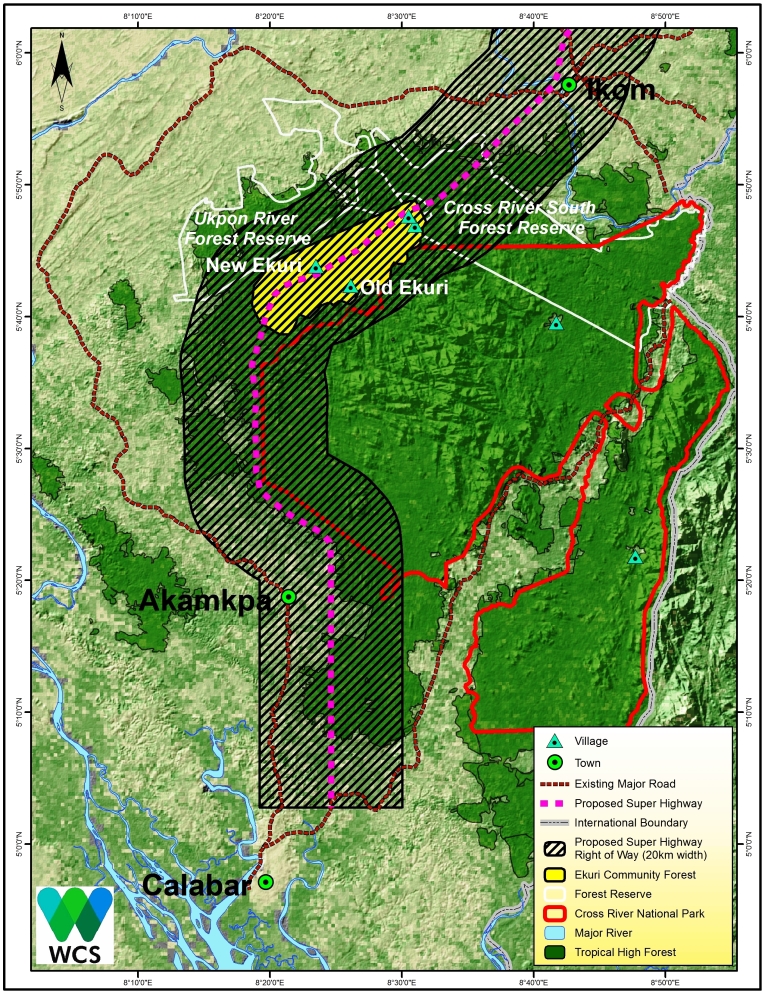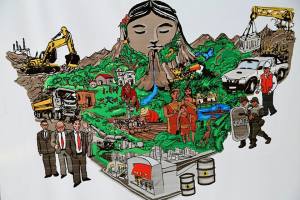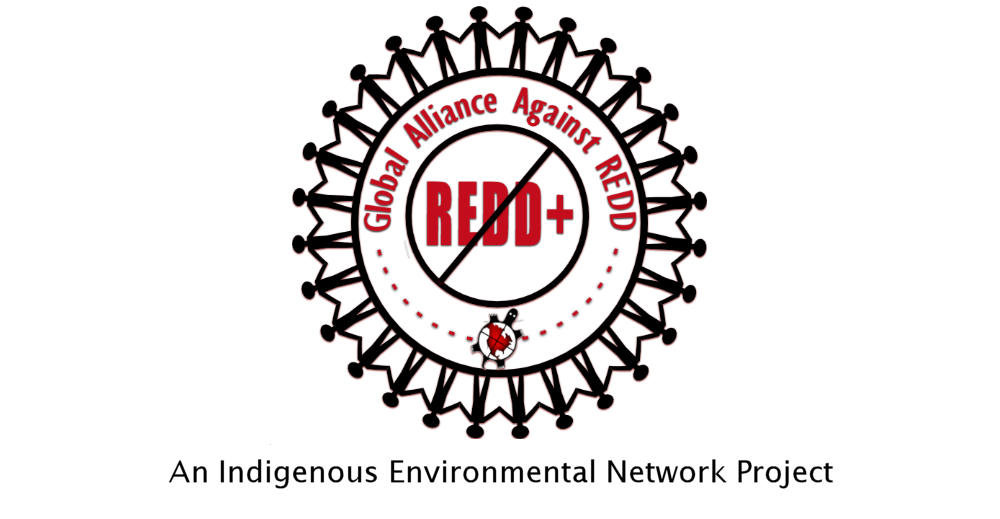Sep 1, 2016
 This week, Benedict Bengioushuye Ayade, the governor of Nigeria’s Cross River State, will be in Guadalajara, Mexico taking part in the Governors’ Climate and Forests Task Force Annual Meeting. The aim of the GCF is to link states and provinces running REDD programmes with carbon markets in the rich countries.
This week, Benedict Bengioushuye Ayade, the governor of Nigeria’s Cross River State, will be in Guadalajara, Mexico taking part in the Governors’ Climate and Forests Task Force Annual Meeting. The aim of the GCF is to link states and provinces running REDD programmes with carbon markets in the rich countries.
But before getting carried away with the REDD promotion tour in Guadalajara, it’s worth taking a quick look at Ayade’s record so far in Cross River State.
In April 2015, Ayade won the election to become governor of Cross River State. He quickly announced a series of massive infrastructure projects in Cross River State. The Calabar Deep Seaport. The biggest garment factory in Africa. Several new cities. And a six-lane, 260-kilometre-long superhighway.
The superhighway through the forest
The superhighway is particularly controversial. Construction started in October 2015, before an environmental impact assessment had been carried out. After complaints from the National Park authorities, the route of the road was changed, to avoid going through the Cross River National Park. But large areas of forest remain under threat, including the Ekuri Community Forest.
The road would cost US$3.5 billion, but it is unclear where the money would come from. Little is known about the company building the road and the deep sea port, Broad Spectrum Industries Limited, apparently has no experience of road construction. The company may be based in Israel, Germany, or Port Harcourt, depending on which news report you’re reading.
On 22 January 2016, a Public Notice of Revocation was published in a local newspaper. It was signed by the Commissioner for Lands and Urban Development. The Notice stated that,
“all rights of occupancy existing or deemed to exist on all that piece of land or parcel of land lying and situate along the Super Highway from Esighi, Bakassi Local Government Government Area to Bekwarra Local Government Area of Cross River State covering a distance of 260km approximately and having an offset of 200m on either side of the centre line of the road and further 10km after the span of the Super Highway, excluding Government Reserves and public institutions are hereby revoked for overriding public purpose absolutely”.
Which would look something like this:

In March 2016, construction of the road was stopped, until an environmental impact assessment is carried out. While an EIA has now been carried out, Nigerian environmentalist Emmanuel Unaegbu writes that it is “inadequate and lacks merit”.
In June 2016, in a post on the Cross River Facebook page, Eval Asikong, an advisor to Ben Ayade, explained that “The Government is not claiming 10 km of land from both sides of the Super-Highway”. Instead, he explains that the “essence” of 20 kilometre wide strip, was for development control where house structures and every piece of land that is contiguous to the super highway is managed for development control and aesthetic value addition. Government does not forbid individuals from building around this perimeter but strongly frowns at indiscriminate building of structures. Besides, the state government intends to build new cities all along the super highway. Government can even paint structures within those areas for the dwellers as long as they adhere to the control measures. Government intent to provide commercial and social infrastructures like hotels, filling stations, etc to improve the environment.
The impacts of REDD in Cross River State
Meanwhile, Cross River State has started to implement REDD programmes that are having an impact on local communities’ livelihoods.
A report by the Nigerian NGO Social Action exposes the costs to forest communities. A task force in the Forestry Commission has a mandate “to enforce a moratorium on forest activities as part of the implementation process”.
Social Action reports that,
With neither adequate consultation nor alternative livelihoods options for communities, the task force has been harassing community members that have depended on the forests for generations. Movement and trade of products deemed to have been derived from the forests are confiscated. At Nwanga Ekoi in Akpabuyo Local Government Area (LGA) for instance, the task force routinely seizes agricultural products like kola nuts and fruits meant for the market on account that they are derived from forests earmarked for REDD + . The harvesting of Afang leaves, a local vegetable consumed in West and Central Africa, is now banned in affected forests. The hunting for bush meat, a main source of protein in the communities, as well as the tapping of palm wine from the raffia palm and associated brewing of kaikai, a local beverage, have been stopped.
In 2008, Liyel Imoke, then-governor of Cross River State, put in place a logging moratorium – a complete ban on wood cutting in all forests. In effect, forests that were under the control of communities have become forest reserves, under the control of the government.
The moratorium also includes harvesting leaves for food and medicine, and subsistence hunting. Bush meat was an important source of protein for forest communities.
Chief Owai Obio Arong of the Iko Esa Community told Social Action that
“I and my people have suffered for five years now since government stopped us from entering our forest because REDD is coming and till now I have not received anything from them.”
Ayade: “The conservation of forests is only a small aspect of the bigger picture”
On 24 August 2016, in a speech at a UN-REDD meeting, Governor Ayade argued that, “The conservation of forests is only a small aspect of the bigger picture”.
Ayade acknowledges that for eight years, forest communities have not been allowed to benefit from the forests.
Ayade demonstrates his ability to say what his audience wants to hear:
“UN-REDD plus is not about finances, it’s not about gross carbon stock, it’s not about monitoring the forests. It’s about social safeguards. It’s about livelihood security of the people.”
He got a round of applause for that.
He spoke “from his soul”, urging UN-REDD to move into the implementation phase:
“That implementation phase will address the pain and neglect, the harrowing poverty of our people, who for the last eight years have suffered a complete ban on their dependence on their forests. Who will now begin to see a legacy of hope.”
Perhaps predictably, he wants more money:
“I understand from statistics that reached us so far that you are proposing about US$12 million in your initial fees in the REDD-ready plus phase and we will move into the implementation phase. US$12 million is very exciting. But the relationship of pain and agony of our people in the last eight years, the relationship to the responsibilities ahead of us, it is very insignificant.”
He asks UN-REDD to focus on tree planting:
“There is a delicate balance between conservation and management. That is what I am asking for UN-REDD plus to focus as they move into the implementation phase. To focus agressively on tree planting. Because when you do, you increase the amount of rainfall. When you do, you reduce the amount of carbon dioxide in the atmosphere.”
Then he talks about the green economy, the decarbonisation of Africa and the world, and about stopping using fossil fuels. He gets quite excited:
“Africa is challenged to seek alternatives for our crude oil. While Africa is struggling with that, Africa is also told, stop cutting your forests.
“Africa therefore is a whipping child. Standing before the world. We don’t have the technology for alternative research.”
At the end of his little speech, Ayade tells us that,
“The modalities and procedures, the validation process must focus on African philosophy of protection of the environment. It must be indigenous. It must be customised to reflect African heritage. Then a man who owns the forest, that pays from the forest, you only teach him how to depend on the forest without exploiting it to the detriment of the future.”
But of course Ayade made no mention of his proposed 260 kilometre-long superhighway in his speech
Source: REDD Monitor
Sep 13, 2015
Stop the disastrous REDD+ experiment!
We are united to oppose and reject the commodification, privatization and plunder of Nature, which include REDD+ and other market-based mechanisms including biodiversity and conservation offsets that put profit above the well being of humanity and the planet.
Sign the declaration and join us today!
Latest Signatures
| 69 |
Ms Oduduabasi A. |
Sep 19, 2022 |
| 68 |
Ms Matilda S. |
Jun 03, 2020 |
| 67 |
Ms Leonarda D. |
Jan 19, 2018 |
| 66 |
Joanne S. |
Dec 01, 2017 |
| 65 |
N. T. |
May 31, 2017 |
| 64 |
Thando M. |
Mar 26, 2017 |
| 63 |
Kamra B. |
Nov 28, 2016 |
| 62 |
Maryanne E. |
Nov 28, 2016 |
| 61 |
Kathleen F N. |
Nov 18, 2016 |
| 60 |
Jessica M. |
Nov 16, 2016 |
| 59 |
Salle D. |
Dec 13, 2015 |
| 58 |
Mary Ellen D. |
Dec 10, 2015 |
| 57 |
Sherry S. |
Dec 10, 2015 |
| 56 |
johnny l. |
Dec 10, 2015 |
| 55 |
Tabitha T. |
Dec 09, 2015 |
| 54 |
Tamhas G. |
Dec 01, 2015 |
| 53 |
Mark P. |
Dec 01, 2015 |
| 52 |
Robben C. |
Nov 30, 2015 |
| 51 |
Lili S. |
Nov 27, 2015 |
| 50 |
Kelly A. |
Nov 26, 2015 |
| 49 |
Marie P. |
Nov 25, 2015 |
| 48 |
Bruce A. |
Nov 23, 2015 |
| 47 |
Leslie W. |
Nov 22, 2015 |
| 46 |
robert j. |
Nov 22, 2015 |
| 45 |
Ann L. |
Nov 22, 2015 |
| 44 |
Hazel L. |
Nov 22, 2015 |
| 43 |
Paloma K. |
Nov 22, 2015 |
| 42 |
CISSY P. |
Nov 22, 2015 |
| 41 |
scott c. |
Nov 21, 2015 |
| 40 |
Alejandro L. |
Nov 21, 2015 |
| 39 |
Dorothy Z. |
Nov 21, 2015 |
| 38 |
Barbars S. |
Nov 21, 2015 |
| 37 |
Michelle L. |
Nov 21, 2015 |
| 36 |
Gabriel H. |
Nov 21, 2015 |
| 35 |
Jan D. |
Nov 21, 2015 |
| 34 |
jen l. |
Nov 21, 2015 |
| 33 |
Julie B. |
Nov 21, 2015 |
| 32 |
gascoin p. |
Nov 21, 2015 |
| 31 |
colette h. |
Nov 21, 2015 |
| 30 |
Steve O. |
Nov 21, 2015 |
| 29 |
N. P. |
Nov 20, 2015 |
| 28 |
Andreas H. |
Nov 20, 2015 |
| 27 |
K P. |
Nov 20, 2015 |
| 26 |
Carla H. |
Nov 20, 2015 |
| 25 |
Robert G. |
Nov 20, 2015 |
| 24 |
Patricia R. |
Nov 20, 2015 |
| 23 |
Brenda Jo M. |
Nov 20, 2015 |
| 22 |
Debbie D. |
Nov 20, 2015 |
| 21 |
Laura M D. |
Nov 20, 2015 |
| 20 |
Richard W. |
Nov 20, 2015 |
|
<
>
|

Durban Declaration on REDD 2015
 Yesterday, activists in Durban, South Africa launched the Durban Declaration on REDD. The Declaration opposes REDD, and rejects the “commodification, privatisation and plunder of Nature”.
Yesterday, activists in Durban, South Africa launched the Durban Declaration on REDD. The Declaration opposes REDD, and rejects the “commodification, privatisation and plunder of Nature”.
The Declaration was launched at an event organised under the Civil Society Alternative Programme, which runs parallel to the World Forestry Congress, also taking place this week in Durban.
Renowned environmental and social activist Nnimmo Bassey, co-coordinator of the No REDD in Africa Network, explained why he opposes REDD:
“All forms of REDD amount to two things: licensing polluters to keep polluting and grabbing lands and other resources from forest and peasant communities. REDD+ started as land grab, in Africa it is becoming a continent grab and if not checked it will turn into a planet grab.”
On the panel with Bassey was Anabela Lemos of Justiça Ambiental – Friends of the Earth Mozambique. She said that,
“Both the World Forestry Congress and the United Nations want to use REDD to grab Africa as a sponge for Northern industrialized countries’ pollution, instead of cutting emissions at source. Mozambique is already struggling with land-grabbing and human rights violations, REDD is going to exacerbate those problems and create more poverty. Already a third of Mozambique has been targeted for REDD.”

The Durban Declaration on REDD
September 2015
We, local communities, peasants movements, Indigenous Peoples and civil society organizations from Africa and all over the world, call upon the United Nations, the World Forestry Congress, the Food and Agriculture Organization (FAO), the World Bank and states to reject top-down forms of development, including false solutions to climate change and forest and biodiversity conservation that only serve the dominant market economy.
We are united to oppose and reject the commodification, privatisation and plunder of Nature, which include REDD+[1] and other market-based mechanisms including biodiversity and conservation offsets that put profit above the wellbeing of humanity and the planet.
These mechanisms include the “financialization of nature,” which commodifies, separates and quantifies the Earth’s cycles and functions of carbon, water, forest, fauna and biodiversity – turning them into “units” to be sold in financial and speculative markets. However, Mother Earth is the source of Life, which needs to be protected, not a resource to be exploited and commodified as a ‘natural capital.’
REDD+ is also the pillar of the Green Economy. REDD+ is being misleadingly billed as saving the world’s forests and climate and is the anticipated main outcome of the UN’s Paris Accord on climate change in December 2015. In addition, REDD+ is a false solution to climate change that is already including forests, plantations and agriculture in the carbon Reports show that deforestation and the related emissions continue, and that REDD+, instead of reducing them, is harming and vilifying forest-dependent communities and those who produce the majority of the world’s food – small scale farmers. Furthermore,
- REDD+ promotes monoculture tree plantations and genetically modified trees
- REDD+ increases land grabs and human rights violations
- REDD+ restricts access to forests, threatening livelihoods and cultural practices
- REDD+ causes violence against peasants, Indigenous Peoples, women and forest-dwelling communities
- REDD+ is combined with other offsets including payment for environmental services (PES)
- REDD+ imposes market driven neo-liberalism on forests, which undermines and monetizes community conservation and social/cultural processes and creates inequalities
- REDD+ projects tend to force subsistence communities into the cash economy and exploitative wage-labor
REDD+ hinders and prevents much needed policies that support endogenous, bio-cultural approaches to biodiversity conservation and restoration.
Therefore, we join with the No REDD in Africa Network and the Global Alliance against REDD to demand that governments, the United Nations and financial institutions stop the disastrous REDD+ experiment and finally start addressing the underlying causes of forest loss and climate change!
Put forward by the No REDD in Africa Network (NRAN) and the Global Alliance Against REDD, with endorsement and support by the following. To be presented to the World Forestry Congress 2015, the UNFCCC COP21 and beyond:
No REDD in Africa Network
Global Alliance Against REDD
Indigenous Environmental Network
JA!/Justica Ambiental – Friends of the Earth Mozambique
All India Forum of Forest Movements/India
CENSAT Agua Viva – Friends of the Earth Colombia
Womin (Womens on Mining)
Foundation Help/Tanzania
Centre from Civil Society/University of KwaZulu-Natal, Durban
Democratic Left Front
[1] REDD+ (Reducing Emissions from Deforestation and forest Degradation) is a global initiative to create a financial value for the carbon stored in forests and all other ecosystems to compensate governments and companies or owners of forests and agriculture in developing countries not to cut their forests or to reduce their rate of deforestation and forest degradation as a market mechanism to avoid GHG emissions. REDD+ expands REDD to develop methods for carbon sequestration through conservation of forest (and wetlands, agricultural systems) carbon stocks, sustainable management of forests and enhancement of forest carbon stocks in developing countries.
PHOTO Credit: Anne Petermann, Global Justice Ecology Project.
 Yesterday, activists in Durban, South Africa launched the Durban Declaration on REDD. The Declaration opposes REDD, and rejects the “commodification, privatisation and plunder of Nature”.
Yesterday, activists in Durban, South Africa launched the Durban Declaration on REDD. The Declaration opposes REDD, and rejects the “commodification, privatisation and plunder of Nature”.



